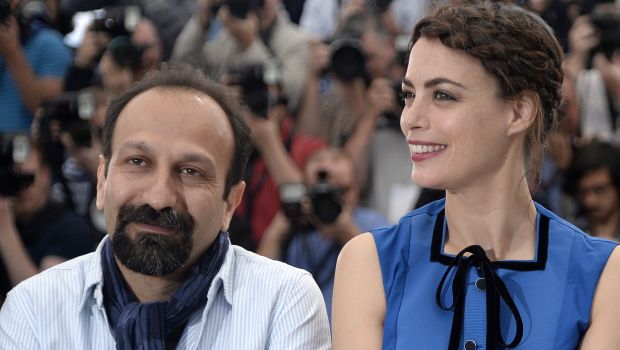
A picture taken on May 17, 2013, shows Iranian director Asghar Farhadi and Argentinian-born French actress Bérénice Bejo posing during a photocall for the film “Le Passé” at the Cannes Film Festival. (AFP PHOTO/ANNE-CHRISTINE POUJOULAT)
Farhadi is hoping to repeat Iran’s success at the Academy Awards next year with his latest contribution, Le Passé (“The Past”). The film was well received at the 2013 Cannes Film Festival, narrowly missing out on the prestigious Palme d’Or, and has since been headlining global film festivals from Toronto to London and Munich to St. Louis.
To celebrate this thriving, creative industry, the UK Iranian Film Festival (UKIFF)—a volunteer-run, independent organization—launched four years ago with a vision of creating an independent cinematic platform for Iranian cinema. Co-founded by Pejman Danaei, the UKIFF put on the 4th London Iranian Film Festival last week, exposing the city’s screens to the artistic creativity of Iranian film-making.
The schedule boasted an impressive variety of screenings and events. Audiences, Iranian and non-Iranian alike, were drawn to reflect on many poignant social themes that resonate beyond the Middle East.
“We currently only show a very small selection of the submissions received, and this is only a fraction of the incredible cinema that is currently being produced in Iran,” explained the UKIFF in correspondence with Asharq Al-Awsat, illustrating how Iranian films are becoming ever more popular. In addition, the UKIFF makes an effort to screen the work of both established and emerging talents. “UKIFF screens more films from up-and-coming Iranian filmmakers than any other organization globally,” the organization said.
The festival hosted a wide range of popular Iranian films breaking both domestic box office records and thematic boundaries. Most notable was the screening of Hush! Girls Don’t Scream by the eminent Iranian female director Pouran Derakhshandeh, who achieved international success with her moving feature film A Little Bird of Happiness in the late 1980s.
Featuring impressive cinematography, Derakhshandeh’s latest film continues to challenge norms and gender inequality. Setting box office records in Iran, Hush! Girls Don’t Scream addresses profound cultural taboos: child abduction, as well as socially and legally constructed confines for victims of sexual violence. The film, a powerful exploration of the conflicting drives of upholding notions of honor and seeking justice, and features highly credible performances from Tannaz Tabatabaei and Merila Zarei. The film has already been awarded the Best Film prize at the Fajr International Film Festival.
Female empowerment was highlighted in several of the films showcased, all in different social contexts and also using very different cinematic methods. For example, the narrative of I Am His Wife grips the audience with twists and the calculations of the lead female character, skillfully portrayed in great detail. The protagonist initially appears overwhelmed and overpowered in her unhappy marriage, and is driven to take revenge. Yet director Mostafa Shayesteh drives the unhappy wife’s primary identity as a woman to the forefront, against the background of her roles as wife and mother. Her overlapping identities are neither neglected nor subjected, but rather realigned.
In comments to Asharq Al-Awsat, the festival organizers reflected on the significance of their platform for the wider Iranian film industry. They view their role in promoting the selected films as providing important exposure that can in turn attract audiences, both within Iran and internationally, as well as grabbing the attention of international distributors to screen Iranian films.
The UKIFF also discussed the relationship between political developments and the creative industries in Iran: “Iran’s situation in the international scene and the pressure of the sanctions on the Iranian people have encouraged more Iranians to communicate their thoughts through film-making or other art forms.”
“With the current changes in the Iranian government, previous situations have indicated that, at least for the first couple of years, art-related activities such as film-making will receive a boost, with a greater number of licenses allocated and films produced,” it added.
The UKIFF also welcomed the reopening of as Iran’s main cinema guild, the House of Cinema, as an organization that collaborates with industry professionals and provides them with representation and networking opportunities. Adding this to the growing political changes and creative exploration, the UKIFF anticipates an “incredibly exciting” future for Iranian cinema.
Among the films to close this year’s festival was The Wedlock, directed by Rouhollah Hejazi. Exploring marital dynamics within one household over a few days, mirroring a stage production, the film immerses audiences in the personal struggles of the protagonists. The poignancy of the name and the single setting is not lost on the audience as the film unravels the layers of personal conflict disguised by the formulaic familial paradise—a lasting marriage—exalted by cultures around the world.
The festival also showcased more comical movies, among which was Adel Yaraghi’s Meeting Leila. Starring Leila Hatami (A Separation) as Leila and Bahareh Rahnama as Nader, the film is a romantic comedy that manages not to romanticize the lackluster reality of relationships and the compromises they require. The story is both endearing and witty, and Rahnama gives an entertaining performance, convincingly demonstrating his compulsive addiction to cigarettes.
The UKIFF hopes to continue to grow the number of screenings and audiences for future festivals. The organization also wishes to boost collaborative projects within Iran and international organizations in order expose even more audiences to Iranian cinema.
It can only be hoped that improved political relations between Iran and the West will improve. “Although we are currently limited in not having an Iranian embassy here in the UK, we hope that improved relationship between Iran and the British government will allow us to expand our collaborations with Iranian film industry members and organizations,” they said.
